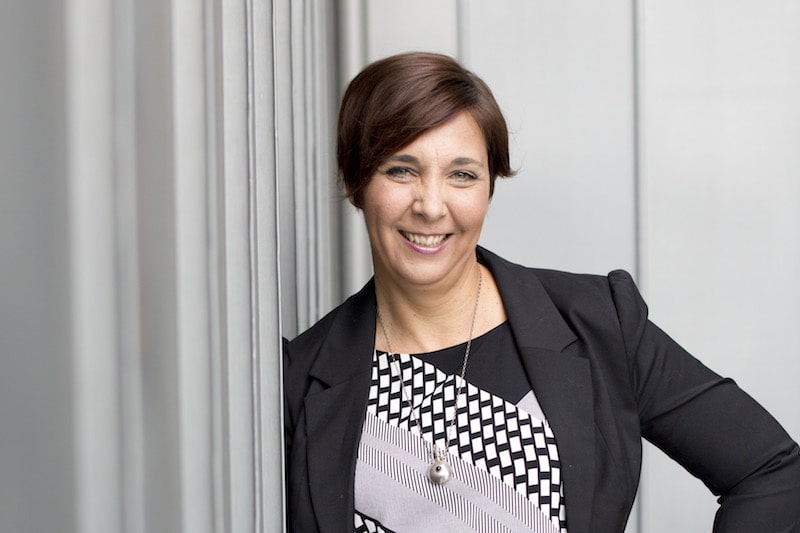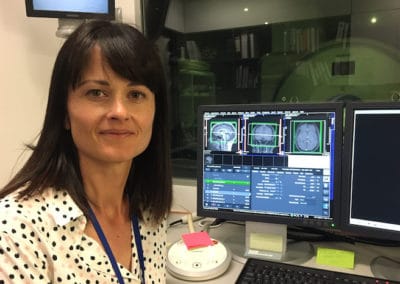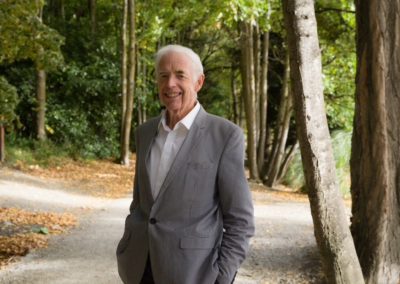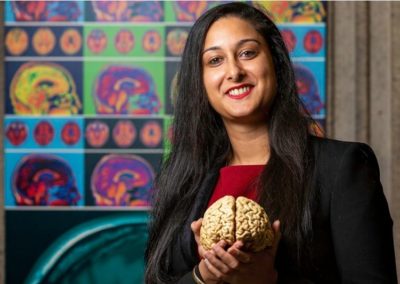Tell us a little bit about your research, what do you do?
I am a Neuropharmacologist which means I explore new ways to treat brain disease or injury. I have developed a unique technique which allows us to make brain cells directly from the skin cells of patients with neurological disease. We can then study these cells to learn how the disease begins and progresses which hopefully will give us new targets for drugs to prevent brain cells from dying. Alternatively, we can inject the brain cells back into the patients’ own brain to replace the cells that have died.
Which (female) scientist inspires you most?
Science is very creative. You have to think about an idea or a problem and design or develop a way to explore it. I love doing this. As a researcher you are also a bit like a detective, finding clues and putting them all together to work out the answer. Mainly, I love the fact that I am never doing the same thing everyday and I get the chance to do what excites me/ what I am passionate about.
How did you get interested in (neuro)science?
When I started University I was going to study Sports Science. In my first year I decided to take a General Psychology class in which we learnt about the human brain. I started reading about the brain and I fell in love! What an incredible organ of which we still know so little about. The fact it controls everything, from basic function through to personality, emotions, and dreams. I decided to forget about Sports Science and I studied neuropsychology, neurophysiology and neuropharmacology to complete a degree and then a PhD in neuroscience. I decided to do research in neuropharmacology as it is important to me that my research may one day make a difference to the quality of people’s lives.
Which (female) scientist inspires you most?
NZ astronomer and cosmologist Beatrice Tinsley. Her research made fundamental contributions to the astronomical understanding of how galaxies evolve, grow and die. However, she encountered sexism throughout her career, not being able to be employed at the same University as her husband and unable to find a permanent academic position regardless of her internationally acclaimed research. She also struggled with no support trying to balance work, home and family with her husband’s career deemed more important. She finally left her husband and 2 children to take a position at Yale University until her death in 1981 at age 40.
Though I despair at the way she was treated as a female scientist and the sacrifice she eventually made regarding her family, I am inspired by her determination and passion as well as the incredible discoveries she achieved.
What were the greatest challenges you have faced as a female scientist? How have you overcome them?
In relation to previous generations of female scientists, I don’t really think I had many challenges to overcome. It is thanks to them that my journey has been much easier. The main challenges I had to face during my career was being the only woman in an all-male department and having to ignore the “boys club” comments and jokes at meetings. Luckily I was joined by several other female colleagues after a few years and this behaviour vanished. I have also spent half of my career as a solo Mum, juggling raising 2 boys and working full time. This taught me to be very efficient with my time and to prioritise tasks (I continually make lists of most to least important tasks for the day). I also learnt when to say “no” to ensure I had some time for me, or to spend with my kids.
What needs to change to make things better for the next generation of women and girl scientists?
The main issues that needs to improve for the next generation of women scientists (and for working women in general) is pay-equity and flexible work hours to accommodate childcare and wellbeing.
What advice would you give to young women and girls today?
Find your passion and go and do it. And if anyone tells you that you can’t do something because you are a girl, go and prove them wrong!
Prof Bronwen Connor is a Principal Investigator at Brain Research New Zealand, and head of the Neural Reprogramming and Repair Lab at the University of Auckland. She is a Member of the New Zealand Order of Merit.
Read about more inspiring neuroscientists in our Women in Science series.



